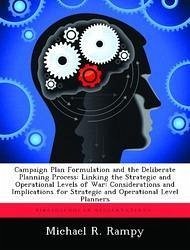The campaign planning process is the essential link between the strategic and operational levels of war. Since the final large unit operations of World War II, the American military has lost its expertise in campaign planning. The study examines the deliberate planning process of World War II and the contemporary Joint Operations Planning System (JOPS) in relation to campaign plan formulation. The study begins with the development of a theoretical construct to analyze the campaign planning process. The study then proceeds to analyze the strategic and operational deliberate planning "process" of World War II by tracing the formulation of the campaign plan to defeat the Japanese in the Pacific theater of war. The study progresses to an analysis of the contemporary JOPS and its ability to link the strategic and operational levels of war through the process of campaign planning. A comparison and contrasting of both deliberate planning mechanisms yields insights and conclusions that are applicable to the current status of campaign planning. Some insights and conclusions derived from this study are: the current JOPS does not formally recognize nor adequately support the campaign planning process and that the process of campaign planning is just as important as the actual campaign plan itself. Furthermore, the study concludes that an unrestrained thought process, similar to the World War II strategic and operational planning paradigm, not a restrained thought process, like the contemporary JOPS, is a prerequisite in developing a viable campaign planning process. The study concludes with considerations and implications for a contemporary campaign planning process linking the strategic and operational levels of war in support of the operational art.
Hinweis: Dieser Artikel kann nur an eine deutsche Lieferadresse ausgeliefert werden.
Hinweis: Dieser Artikel kann nur an eine deutsche Lieferadresse ausgeliefert werden.








